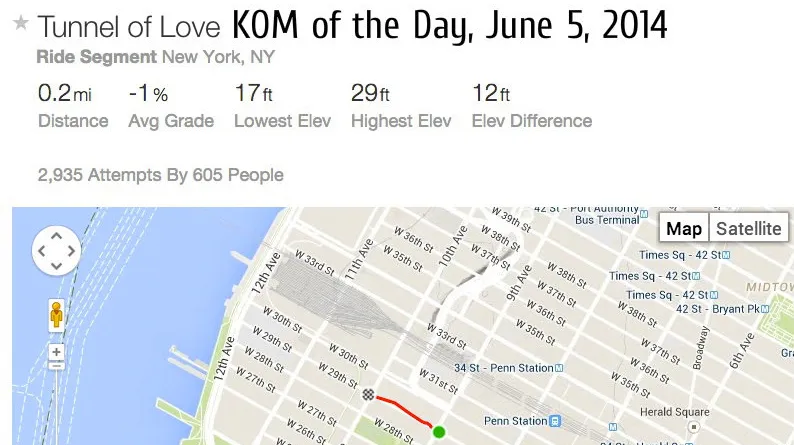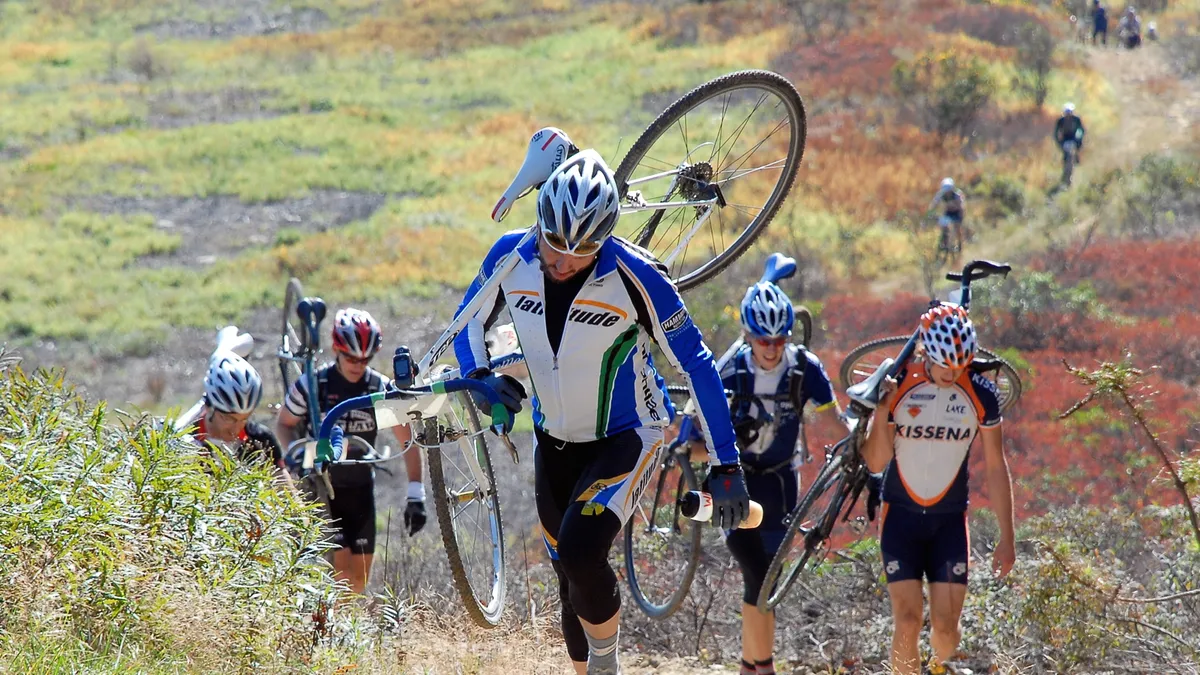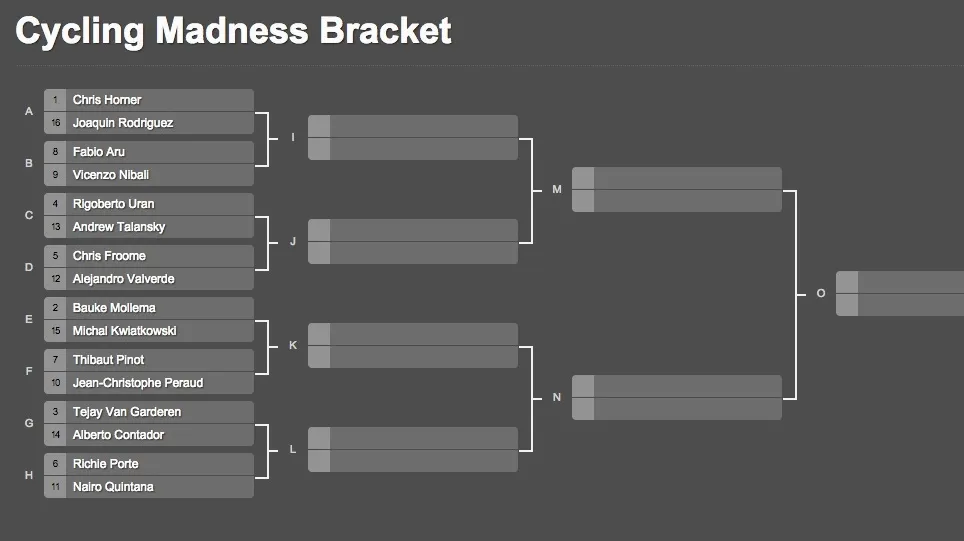At BikeRadar, we strive to bring you the best inventions and innovations from the bike world. But in this column, contributor Fred Dreier explores his own wacky bike ideas, and consults various experts as to their validity. Warning: these ideas are anything but fully baked.
It’s been five years since Strava transformed once innocuous stretches of road into digital battlegrounds. In some towns — looking at you, Boulder, Colorado — nearly every inch of road, trail and sidewalk has its own KOM leaderboard containing the names of Grand Tour stage winners, domestic pros, or trust-funders who train more than they work.
In these über-competitive Strava markets, how is a regular Joe supposed to earn his share of KOM (or QOM) bragging rights?
Problem 1: I want some KOM (or QOM) love, but the lousy pro cyclists in my town have gobbled up all of the glory.
Half Baked Cycling Idea: Hey Strava, why not roll out a KOM (and QOM) Of The Day leaderboard?
For oft-ridden segments, Strava could create a daily leaderboard showing the fastest men and women on any given day. I’m no computer genius, so I phoned up Strava’s communications chief Michael Oldenburg to pitch my idea.
Oldenburg said that Strava engineers regularly brainstorm ideas for making leaderboards “more approachable” for average cyclists. The network’s latest features — the Segment Comparison tool and real-time segment feedback — attempt to do that.
Oldenburg liked my KOM Of The Day idea, but said that the company’s limited resources make the idea a non-starter, for now anyway. In the last two years Strava has doubled its staff to 90 full-time employees, who work hard just to keep up with the needs of its growing membership.
“It’s a question of prioritization of resources,” Oldenburg said. “There are so many great ideas, we have to focus on the ones that have the most impact.”
I suppose we’ll have to wait and see on this idea. In the meantime, stay away from my KOM’s, pro cyclists.

In my ever-present quest to get rich quick from cycling, I’ve noticed that two racing formats are currently booming: cyclocross and gran fondos. Bike companies are also pushing gravel bikes on consumers, and so-called “epic ride” events are the new norm.
Problem 2: I want to get rich quick by organizing bicycle races.
Half-Baked Cycling Idea: Create a ’Cross Fondo event, collect entry fees, laugh all the way to the bank.
This idea isn’t new. In the US, the Crusher in the Tushar, Dirty Kanza 200 and Rapha Gentlemen’s Race events are all painful endurance events that cater to cyclocross or gravel bikes. But I want my race to be a true cyclocross event, and that means plenty of bike schlepping.The closest comparable events to my idea are the 3 Peaks Cyclo-Cross race in the UK, and the Iron Cross race in southeastern Pennsylvania.
Mike Kuhn, Iron Cross race director, said he attracts around 350 participants each year, which covers his costs. Obtaining permits for the off-the-bike sections, unfortunately, is a real headache. Kuhn said he’s overhauling the course for next year because of heavy camping and hunting use in the local forests.
He also said that the format still inhabits a gray area in the racing market, which limits participation.
“People who do [gran fondos] want to be fit enough to feel good at the end,” Kuhn said. “Some people are scared off because they aren’t sure if they can even ride on our terrain.”
Plenty of race directors have warned me that organizing any type of bike race (cyclocross included) is the quickest way to go into debt, upset my neighbors and suffer a stress-induced heart attack. The key to any race is mitigating costs.
Reuben Kline, organizer of the Gran Fondo National Championships Series, estimates my idea would require at least US$20,000 to US$30,000 in overhead expenses, depending on the number of road closures and trail permits. Timing chips alone run US$7,000.
Kline echoed Kuhn, and said that cyclocross bicycle owners tend to be hardcore racers, but Gran Fondo participants are often more casual cyclists.
“We get more recreational cyclists than hardcore racers,” Kline said. “So you’d have to win [racer] support.”
Winning their support sounds like it would take time, which torpedoes the “quick” part of my “get rich quick” idea. Still, if any entrepreneurs are reading, proceed with patience.

Every March I become extremely jealous of traditional American sports fans and their office pool brackets for the national college basketball tournament. Why doesn’t cycling have a gambling game similar to March Madness?
Problem 3: Cycling has no bracket-worthy tournament like March Madness.
Half Baked Cycling Idea: Create some type of bracket gambling game for cycling.
This year Road ID rolled out its Tour de France bracket contest, which awarded $1 million to anyone to correctly guess the top-10 GC finishers. How many brackets survived Contador and Froome pulling out? Who knows?
I posed the question to David Cornelius, CEO of Challonge.com, which produces brackets for various sports competitions. He said that while the final GC might not work with a traditional bracket, the other prizes — such as the KOM or Sprinter’s Jersey — could work. He said the success rests on the creativity of the contest.
“For instance, you could do one for King of the Mountains contenders where each round in a bracket could be associated with a Tour de France stage (likely the most climber-centric stages),” Cornelius said. “Start with 32 notable climbers in round 1, or 16 match-ups. Whichever rider in each match-up scores the most points for the stage advances to the next round.”
I think it could work. But there is one other hurdle standing in the way. Larry Lubman of PoolHost.com posed a good question:
“Doping is another factor. If there were a Tour de France bracket game or pool in previous years how would past participants react to disqualified past champions in relation to their results years later?”
I suppose there could be a retroactive awarding of the office pool champion in the case of a doping offense. Would tainted beef count?
